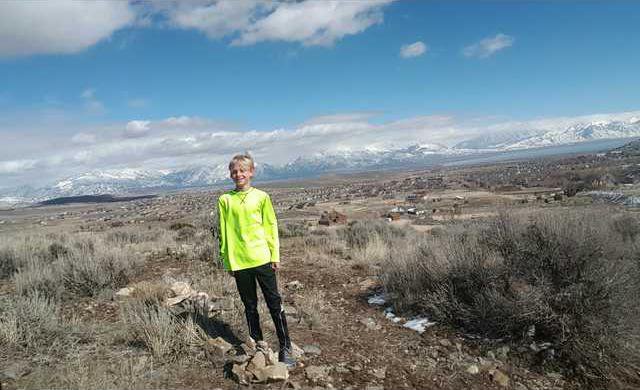It is no secret that I love to run. For as long as I can remember, running has been my escape. I used it to escape from kissy boys on the playground and later on as a means to escape high school with an athletic scholarship. Now, as a mother of seven children, it has served most days as my escape from the hardships of motherhood. Running allows me hands-free time when I can focus on me.
Recently, however, a few of my children have shown an interest in running. To satisfy this learned and, I believe, inherited craving, I have tried to find opportunities to let them run. I have entered them in local kid races and 5Ks. I have signed them up for running clubs and cheered them on at practices and meets.
What I havent done, however, is share my running time with them. Ill admit, I have been selfish with my time because it is the only time I get.
All that changed a couple of weeks ago when my 10-year-old son, Ace, asked if he could go running with me. When he did, I admit I was a bit hesitant. After all, it was my time away time that I hold precious.
Thoughts began to run through my head, thoughts such as: What if he likes it? Will I need to share more time with him? What if the other kids see us and want to come, too? Are my days running by myself over?
As I debated what I would say, a question came to my mind that made my decision clear: What if he never asks again?"
Minutes later, the two of us were running on one of my favorite single track dirt trails, traversing over rocks and splashing through mud. Ace was doing great, and I quickly found that he was on my heels, begging to go faster. I stepped aside to let him pass, and there was no stopping him.
As I struggled to keep up with him, I realized that it wasnt my children who were holding me back it was me holding them back. In my selfishness, I was keeping Ace from experiencing something that I had kept to myself for far too long.
Over the next five miles, we zigzagged along the hillside and saw bunnies dart past us. We even had the pleasure of spotting a family of deer stand huddled a few yards ahead of us, waiting to see what direction we were headed before they went the other way, far from view.
As we took those final steps up our driveway to our home, I felt an extreme sense of gratitude toward Ace for asking if I could share my running time with him. Just as I was about to express my gratefulness, Ace beat me to it. He put his arm around me and said, Thank you for running with me, Mom.
I look forward to more runs with Ace and my other children.
And I hope that when I ask, they say yes.
Recently, however, a few of my children have shown an interest in running. To satisfy this learned and, I believe, inherited craving, I have tried to find opportunities to let them run. I have entered them in local kid races and 5Ks. I have signed them up for running clubs and cheered them on at practices and meets.
What I havent done, however, is share my running time with them. Ill admit, I have been selfish with my time because it is the only time I get.
All that changed a couple of weeks ago when my 10-year-old son, Ace, asked if he could go running with me. When he did, I admit I was a bit hesitant. After all, it was my time away time that I hold precious.
Thoughts began to run through my head, thoughts such as: What if he likes it? Will I need to share more time with him? What if the other kids see us and want to come, too? Are my days running by myself over?
As I debated what I would say, a question came to my mind that made my decision clear: What if he never asks again?"
Minutes later, the two of us were running on one of my favorite single track dirt trails, traversing over rocks and splashing through mud. Ace was doing great, and I quickly found that he was on my heels, begging to go faster. I stepped aside to let him pass, and there was no stopping him.
As I struggled to keep up with him, I realized that it wasnt my children who were holding me back it was me holding them back. In my selfishness, I was keeping Ace from experiencing something that I had kept to myself for far too long.
Over the next five miles, we zigzagged along the hillside and saw bunnies dart past us. We even had the pleasure of spotting a family of deer stand huddled a few yards ahead of us, waiting to see what direction we were headed before they went the other way, far from view.
As we took those final steps up our driveway to our home, I felt an extreme sense of gratitude toward Ace for asking if I could share my running time with him. Just as I was about to express my gratefulness, Ace beat me to it. He put his arm around me and said, Thank you for running with me, Mom.
I look forward to more runs with Ace and my other children.
And I hope that when I ask, they say yes.








